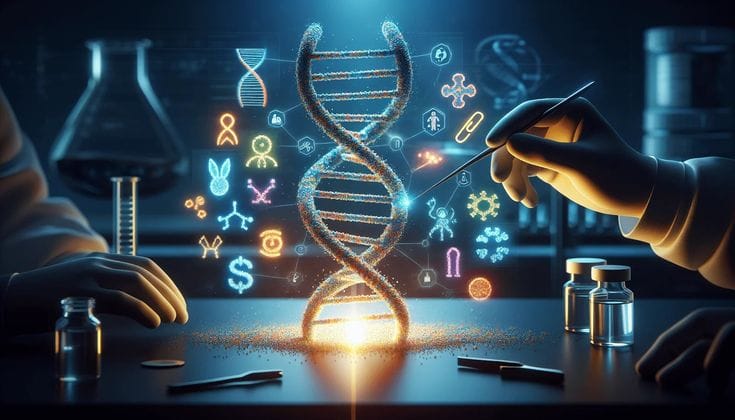Have you ever dreamed of solving real-life mysteries using science? Welcome to the fascinating world of DNA and forensics career! Whether you’re drawn to crime labs, courtroom testimonies, or behind-the-scenes DNA analysis, forensic science opens thrilling doors. From becoming a DNA analyst to exploring careers in forensic labs, this path combines curiosity, justice, and biology in one exciting career journey.
Introduction to Forensic Science Careers
Forensic science careers offer a fascinating and impactful path for those passionate about justice, science, and technology. With growing demand across the world, careers in forensic science include a range of roles—from technician to forensic scientist to DNA analyst. These professionals work in laboratories, crime scenes, and courtrooms to uncover truth through evidence and analysis. As technology advances, the field of forensic science continues to evolve, offering new opportunities and career growth.
What Is Forensic Science?
Forensic science is the application of scientific methods to solve crimes and analyze evidence. It combines disciplines like biology, chemistry, genetics, and biochemistry to support criminal investigations. Forensic scientists work in forensic labs and often collaborate with law enforcement agencies. Their primary goal is to analyze forensic evidence, such as fingerprints, chemical residues, and forensic DNA, to establish facts in legal cases.
Key Roles in Forensic Careers
Careers in forensic science include several specialized roles. A forensic science technician assists in collecting and documenting evidence at crime scenes. Forensic DNA analysts perform DNA analyses on samples collected from crime scenes. Forensic scientists may also specialize in digital forensics, forensic anthropology, or forensic psychology. These roles often require strong lab work skills, analytical thinking, and attention to detail.
Did you know that DNA can be extracted from a single hair root?
Why Choose a Career in Forensics?
A career in the forensic field offers meaningful work that directly contributes to justice and public safety. Whether working as a forensic DNA analyst or a forensic science technician, individuals in these roles play a key part in criminal investigations. Additionally, the Bureau of Labor Statistics projects strong job growth and positive career outlook in the field of forensic science, particularly for those with a bachelor’s degree in forensic science or a related natural science.
Read about Clean Wash Shower Cap
Understanding DNA Analyst Roles

DNA analysts play a critical role in modern forensic science. Their work in laboratory settings involves identifying individuals based on genetic information. As part of forensic casework, DNA analysts help law enforcement connect suspects to crimes or exonerate the innocent.
What Does a DNA Analyst Do?
A DNA analyst analyzes DNA samples from crime scenes, suspects, and victims to develop DNA profiles. They use forensic DNA analysis to match samples and often testify in court about their findings. These professionals must ensure chain of custody and follow strict protocols to maintain accuracy in every forensic examination.
How Forensic DNA Analysts Help Solve Crimes
Forensic DNA analysts contribute to solving crimes by providing scientific evidence that links individuals to criminal activity. Their analyses can confirm the presence of a suspect at a crime scene or exclude individuals from suspicion. Many forensic DNA analysts work closely with police departments, prosecutors, and forensic scientists to support casework.
Work Environment and Daily Tasks
DNA analysts typically work in forensic science laboratories, also known as crime labs. Their daily tasks involve conducting DNA testing, preparing reports, and sometimes presenting evidence in court. Most DNA analysts spend hours in the lab using tools for molecular biology and chemical analysis, and must follow standards set by the American Academy of Forensic Sciences.
How to Become a DNA Analyst
Becoming a DNA analyst involves education, certification, and hands-on experience. It’s a rewarding path for those who enjoy science, problem-solving, and contributing to the justice system.
Education Requirements and Certifications
To become a DNA analyst, you need at least a bachelor’s degree in forensic science, biology, biochemistry, or molecular biology. Some pursue a Bachelor of Science or even a Master of Science in Forensic Science. Analyst certification from a recognized body is often required to work in accredited forensic laboratories.
Gaining Work Experience in Forensic DNA
Work experience is vital for aspiring forensic DNA analysts. Internships or entry-level roles in forensic labs help build practical skills. Many forensic science programs offer hands-on training, and experience in forensic casework is a major advantage when applying for full-time forensic DNA analyst jobs.
Did you know that forensic DNA analysts must complete rigorous training and certification?
Analyst Certification and Training Paths
Certification ensures credibility and adherence to professional standards. The American Academy of Forensic Sciences and other organizations offer analyst certification. Candidates must complete education programs accredited by the Education Programs Accreditation Commission and demonstrate expertise in forensic DNA analysis.
Exploring Forensic Science Technician Jobs
Forensic science technicians are essential to crime scene investigations and lab work. They support forensic scientists and analysts by collecting evidence and performing routine tests.
Duties of a Forensic Science Technician
A forensic science technician collects, processes, and documents evidence from crime scenes. In the lab, they conduct chemical analysis, prepare specimens, and assist in DNA testing. Evidence technicians are responsible for ensuring sample integrity and proper labeling.
Required Skills and Background
Technicians need a strong foundation in biology and chemistry, good observational skills, and attention to detail. A bachelor’s degree in forensic science or a related natural science is typically required. Some may specialize in general forensics, while others focus on digital forensics or forensic biology.
Career Outlook for Technicians
According to the Bureau of Labor Statistics, job openings for forensic science technicians are expected to grow steadily. The career outlook is especially strong for those with lab work experience and advanced technical training. Salary for forensic science technicians varies based on location, experience, and education.
Read about Darwin’s theory about Evolution
The Process of Forensic DNA Analysis

Forensic DNA analysis is a precise and complex process that requires specialized knowledge and tools. It plays a crucial role in criminal justice and forensic casework.
Steps in DNA Analyses
DNA analyses begin with sample collection from a crime scene. Samples are extracted, purified, and amplified using molecular biology techniques. Analysts then develop DNA profiles and compare them to known databases. Maintaining chain of custody is critical throughout the process.
Tools Used in Forensic DNA Analysis
DNA analysts use advanced tools such as thermal cyclers, electrophoresis equipment, and automated sequencers. Forensic DNA evidence must be handled with care, using sterile environments and precise instrumentation to ensure reliable results in every forensic analysis.
Accuracy and Challenges in DNA Testing
While forensic DNA testing is highly accurate, challenges include contamination, degraded samples, and limited DNA quantities. DNA analysts must follow strict lab protocols to avoid errors. Their findings are often used as decisive evidence in courtrooms.
Did you know that jobs in forensic science are projected to grow 13% by 2032?
Career Outlook and Growth Opportunities
The field of forensic science is rapidly growing, offering a wide range of career paths and opportunities for advancement.
Job Demand for Forensic Scientists
There is a strong demand for forensic scientists in law enforcement, government agencies, and private laboratories. Many forensic scientists work in forensic laboratories supporting criminal investigation and casework. The career outlook is especially promising for those with experience and specialized training.
Salary Expectations for DNA Analysts
DNA analysts earn competitive salaries, with the annual salary depending on education, certification, and geographic location. Professionals with analyst certification and years of lab experience can expect higher compensation. The majority of DNA analysts work for local or federal agencies.
Long-Term Careers in Forensic Science
A long-term career in forensic science offers stability, impact, and growth. Whether working as a forensic biologist, forensic scientist, or technician, opportunities exist in forensic laboratories, crime labs, and academia. With continuing education and analyst certification, professionals can move into leadership or teaching roles, shaping the next generation of forensic experts.
Frequently Asked Questions about DNA and Forensics Career
Which jobs combine DNA analysis and forensic science?
Jobs like forensic DNA analysts, DNA analysts, and forensic science technicians all combine forensic science with DNA analysis work.
What is the highest paid forensic career?
The highest paid forensic career is typically a forensic scientist working in federal agencies, especially with advanced analyst certification and strong work experience.
What careers work with DNA?
Careers in forensic science like DNA analyst, forensic DNA analyst, and technician roles focus on DNA analyses in labs and investigations.
If you love solving puzzles, have a passion for science, and want a career that makes an impact, DNA and forensics could be your perfect match. Are you ready to uncover the truth—one strand of DNA at a time? Let’s explore your future in forensic science!
Read also about The End of Life on Earth